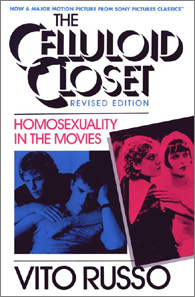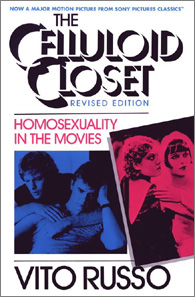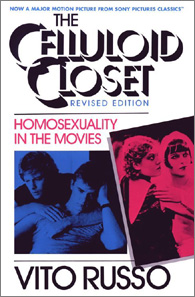What makes a book a gay book? Gay content or a gay author? I would classify anything of interest to gay people, or anything that has touched our lives, as a gay book.

The Celluloid Closet (1981) remains one of the most provocative and informative books about gay and lesbian characters in Hollywood movies since the 1920s.
When I was a young teenager, I had no access to books with gay content. I lost myself in a world of fantasy. I escaped in fantasy books such as The Hobbit and The Lord of the Rings by J. R. R. Tolkein, The Earthsea Chronicles by Ursula K. Le Guin, or The Chronicles of Thomas Covenant by Stephen R. Donaldson. The central character of the latter was no typical hero - he had raped an under-aged girl and was an outcast. Somehow I identified with his trials, feeling as despised as a child rapist in my staunchly religious Mid-Western village, and looked forward to the day I would be as victorious over my taunters at school as Covenant ultimately is. How many of us wished we had some magic weapon to strike all those bullies down?
I found it easier to identify with a world of magic and adventures that was free of boy-girl love stories. Part of my emerging gay identity was violently turned off by heterosexuality, a feeling that has lasted to this day. I still refuse to buy and read "normal" love stories.
I was also hampered as a curious youth by my local librarian, a hawkish old bag who attended the same church as me. Not only had she controlled the content of the library's shelves, meaning the only references to homosexuality I could find were in the Encyclopedia Americana, she also informed my priest that I was reading books on the occult which got me into serious trouble. Father Murphy almost performed an exorcism on me!
This was the 1980s and the Internet was in its infancy. Now gay kids have access to much more information than we did then. My salvation came at high school. I went to a good private school and got a grounding in the classics. I excelled at languages and my Greek and Latin teacher did not censor gay content. I remember vividly reading a poem by the Roman author Catullus about inserting a halibut into the ass of his unfaithful catamite. My teacher also told us about the Spartan soldiers whose love for each other gave them strength in battle. I was fascinated and gathered as much extra material I could.
It was also at school that I read gay authors such as Andre Gide and Jean Genet in French class. Genet's Querelle was disturbing. In fact, much of the literature I got hold of in my teens was depressing in content. There was always death and misery. Whether it was Wilfred Owen writing about love in the trenches of World War One, or Christopher Isherwood writing about the decadent but doomed world of Berlin between the wars, I did not find characters that made me feel good about myself, and this weighed heavily on me. I became a withdrawn and introverted mid-teenager.

The Celluloid Closet (1981) remains one of the most provocative and informative books about gay and lesbian characters in Hollywood movies since the 1920s.
Total freedom came at college when I could read whatever I wanted, and where there were other gay people who had books to share and recommendations. My favorite books from this era are the six titles in the Tales of the City series by Armistead Maupin. For the first time I found a group of quirky individuals that I found "normal". At that time, the publisher was releasing newly bound editions, delaying each by about one each month. I was waiting outside the store each time a new title was released and rushed home to read it. I have re-read those books at least six times over the years.
College was also the time I became more politically aware and wanted to find out more about gay lives and history. Despite the off-putting title and often verbose content, John Boswell's Christianity, Social Tolerance, and Homosexuality: Gay People in Western Europe from the Beginning of the Christian Era to the Fourteenth Century fascinated me. I have since read his Same-sex Unions in pre-modern Europe and found it equally fascinating. Knowing that we have not popped up as a late twentieth century aberration is important for our sense of pride in ourselves.
I am still interested in knowing more about where we came from and am currently reading Colm Toibin's Love in a Dark Time: And Other Explorations of Gay Lives and Literature. And I would recommend Vito Russo's The Celluloid Closet: Homosexuality in the Movies to any of you who thought Hollywood had closed us out.
Another area of literature that is of the utmost interest to gay people is the biography. In addition to reading about pop culture icons like Geri Halliwell (Ginger Spice), I have really enjoyed finding out about significant gay people, such as Boy George. His eponymous autobiography is a hair-raising, eye-opening race through the late seventies and the eighties. Joe Orton's biography, Prick up your Ears by John Lahr, The Naked Civil Servant, Quentin Crisp's autobiography, and British actor and raconteur Kenneth Williams' diaries are three examples of lives that had an impact on our history. Often depressing, these books give us a fascinating insight into the times when we were locked up for being queer.

The Celluloid Closet (1981) remains one of the most provocative and informative books about gay and lesbian characters in Hollywood movies since the 1920s.
There are many examples of bad literature that sells just because it has a gay theme (Somebody Killed His Boyfriend by David Stukas is one I found particularly bad recently) or a gay author (anything by Rupert Everett makes me shudder). There are some that are borderline. Mabel Maney writes a good parody of the 1950s girl novel in her Nancy Clue and the Hardly Boys mysteries, but I tired quickly of the jokes. I still managed to make it through A Ghost in the Closet and The Case of the Good-For-Nothing Girlfriend but I doubt I'll be trying the newest Case of the Not-So-Nice Nurse. But Robert Rodi is a shining example of fun writing that is flippantly irreverent. You just have to look at the titles to know what to expect: Fag Hag, Drag Queen, Closet Case, and Bitch Goddess (his latest). You won't be able to put them down.
So let's keep on reading and astounding our straight colleagues with our wit and intelligence. Here is a list of some gay authors whose works I have enjoyed in the past - all can be found on Amazon.com if not at your local bookstore: Sebastian Beaumont, W.H. Auden, Francis Bacon, James Baldwin, William Burroughs, Lord Byron, Noel Coward, Harvey Fierstein, Ronald Firbank, Stephen Fry, Michel Foucault, A.E. Housman, Langston Hughes, Larry Kramer, David Leavitt, Gore Vidal, Edmund White, Walt Whitman, Oscar Wilde, and Tennessee Williams.











 Printable Version
Printable Version









